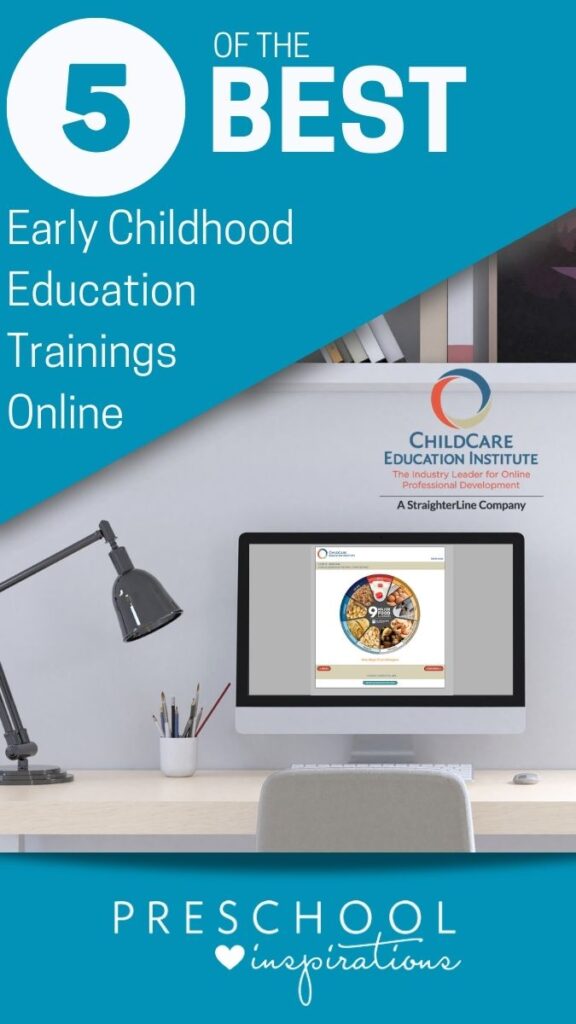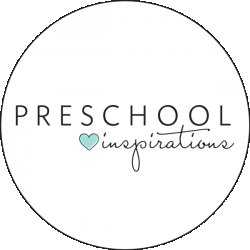We love finding the best early childhood trainings online and sharing about them! If you’re in need of a great training or some extra professional development hours, we’re here to help. Our recommendations for 2023 online courses can be accessed through our favorite online training platform and sponsor, ChildCare Education Institute® (CCEI).
Our top five choices for 2023 online early childhood trainings are:
- Food Allergies in the Early Care Setting
- Birth to Five: Child Development in Young Children
- Child Abuse: Signs of Abuse and Reporting Requirements for Early Childhood Professionals
- Coping with Crises and Traumatic Events
- Foundations of Positive Guidance
ChildCare Education Institute makes getting your training hours simple and efficient. Their courses are developed by experts and can be accessed anytime of day or night on any device. You can do them from the comfort of your sofa, during nap time at work, or in the 15-20 minute pockets of time throughout your day.

Food Allergies Training
CCEI119: Food Allergies in the Early Care Setting
With a rise in food allergies, we wanted to list this important early childhood training first! Every teacher and director should know about food allergies as most programs have at least one student with one of the eight types of food allergies. It can be scary to have children with food allergies, especially if it is a life-threatening allergy that requires an Epipen. Becoming aware of the signs of allergies, and having a good plan to be proactive about them, will help alleviate this stress so that you can do your best to keep every child in your care safe.
As a parent of a child with allergies, I understand the challenge and complexity that it has. Combining several children with multiple allergies can feel daunting. This CCEI course will give you the knowledge and confidence to make important decisions regarding allergies and even show you how to respond to them when they happen.
Upon course completion, you’ll be able to:
- Prepare a child’s medical file and create safe practices for staff, children, and parents to minimize the risk of allergic reactions.
- Identify the eight major food allergens and types of allergic reactions.
- Identify signs, symptoms, and recommended medical responses to allergic reactions.
- Identify policies for storing food and preventing cross-contamination.
Child Development Course
CHD110: Birth to Five: Child Development in Young Children
Early childhood education without an understanding of child development is like watching an ice skating routine without an ice rink. It can be done, but will be missing the backbone of what is vital for the children as they grow. Many early childhood professionals need to sharpen the saw in this area because there is so much crucial information and also new discoveries that are constantly being made in the field.
The key premise of this course is that in order to plan developmentally appropriate activities, early childhood educators must understand the progression of child growth and development in four key areas:
- Physical
- Cognitive
- Social
- Emotional
This course explores development in these four domains from birth to five years and breaks down each area by developmental age ranges.
Upon course completion, you’ll be able to:
- Define terminology related to child development such as tracking, hand-eye coordination, spatial awareness, emotional literacy, etc.
- Identify major developmental milestones in gross and fine motor skills from birth to age 5.
- Identify major developmental milestones related to the senses from birth to age 5.
- Identify key elements in language development in children from birth to age 5.
- Identify milestones in social and emotional development from birth to age 5.
- Recognize developmentally appropriate activities and strategies that promote development in young children across all domains.
This course is a gem for anyone involved in early childhood education! The seamless organization, comprehensive handout, and vital information make it one that you won’t want to miss!
Child Abuse Training
CCEI112A: Child Abuse: Signs of Abuse and Reporting Requirements for Early Childhood Professionals
Have you ever wondered what your responsibilities are as a mandatory reporter? This course will answer this crucial question and so many more! All early childhood teachers and caregivers need to be aware of the signs and responsibilities that come along with mandatory reporting. We are not only a safe haven in our children’s lives – we are their voice!
This course delves into the history of child abuse laws, specifically breaks down the types of child abuse and signs of each, and focuses on listening, observing, and documenting red flags related to the children in your care. Upon course completion, you’ll be able to:
- Understand what it means to be a mandatory reporter and how to take those actions, when necessary.
- Document and keep specific records on injuries, suspected abuse, etc.
- Identify signs/behavorial indicators of the four types of child abuse: physical, emotional, sexual, and neglect.
- Understand how to ask children in your care open-ended questions that may be pertinent to potential abuse concerns.
This could be one of the most important courses you take that could have a significant impact on the children in your care. Learn how to be the best advocate you can for your precious kiddos!
ECE Emergency Preparedness Training
ADM107: Coping with Crises and Traumatic Events
Do you know what to do in the event of an emergency at your facility? Does your childcare setting have emergency or disaster plans? This course comprehensively addresses these questions and many more. While we all hope to never have to deal with a major emergency or disaster, we all need to be properly prepared!
Several years ago, I was teaching first grade in the Seattle area. The school had an extensive earthquake preparedness plan, including kits that each child brought in at the beginning of the year. One day, the unthinkable happened. I was picking up my students from the library, and the ground began to shake in what felt like great waves. My kids dove under tables and held on faster than I could blink. We followed all procedures and evacuated the building when instructed.
A 6.8-magnitude earthquake hit that day. Thankfully, all of our students were unharmed and our building was structurally okay. Being prepared made all the difference. Despite a scary situation, all staff members knew what to do. That day taught me how you never know when your emergency/disaster preparedness will be needed.
Upon course completion, you’ll be able to:
- Differentiate between an emergency and a disaster.
- Identify recommendations for storage of emergency food, water, and other basic supplies.
- Identify the responsibilities of administrators and staff during and after disasters.
- Identify coping strategies for children and adults in the aftermath of a disaster.
- Identify recommended safety practices related to various types of disasters and security threats (including tornadoes, storms, earthquakes, and terrorist attacks).
- Identify recommended coping strategies related to the death of a child, death of a loved one, incarceration of a parent, or major financial troubles within a family…..and so much more!
This could be one of the most important early childhood trainings online available to you. It truly could save a life.
Foundations of Positive Guidance
GUI106: Foundations of Positive Guidance
Did you know that researchers have been recommending a positive approach to child “discipline” or guidance for nearly 100 years? Research points to many benefits of a positive guidance approach. In today’s ECE field, the word “discipline” is commonly replaced with “guidance.” The teacher is a guide and someone who helps children:
- Navigate social situations
- Express challenging emotions
- And learn how to self-regulate
There is an emphasis placed on traits like trust, self-esteem, self-confidence, autonomy, responsibility and other important skills. Children’s behavior serves a “purpose” and it is a form of communication. When children make poor behavior choices, they are telling us something. When discipline is always the immediate response, the child doesn’t get a chance to actually communicate and work through their issue or problem. On the other hand, using positive guidance puts the child’s needs at the heart of the issue. This course gives an overview of positive guidance and why it is so good for children.
Upon course completion, you should be able to:
- Identify characteristics of positive guidance as an approach to working with young children.
- Identify the possible functions of behavior.
- Understand important connections between positive guidance and prominent child development theories.
- Recognize appropriate positive guidance strategies that can be used with children.
- Learn effective communication strategies to share positive guidance principles with families.
This course might be just what you need to help children through challenging behaviors.
More About ChildCare Education Institute
These five early childhood trainings online are all available to access through CCEI. ChildCare Education Institute provides high-quality, research-based online training courses and programs, relevant to those who work various early childhood settings including:
- Center-based care
- Head Start
- Home child care
- Pre-K classrooms
- After school programs and more
They have more than 200+ English and Spanish training courses that meet licensing, recognition program, and Head Start Requirements. CCEI also offers online national certification programs for national credentials including Director, CDA, and Early Childhood Credentials. CCEI, a Council for Professional Recognition approved training provider, is accredited by the Distance Education Accrediting Commission (DEAC) and is accredited as an Authorized Provider by the International Accreditors for Continuing Education and Training (IACET).
What do other ECE professionals think of ChildCare Education Institute? 99 percent of students say they would recommend CCEI to others, and nearly 9,100,000 online course hours have been completed. Join over 47,700 early childhood professionals who have earned their CDA and other certificate programs. All your online early childhood professional development training needs are in one trusted online source! Get started on an online early childhood training course today.
- Valentine’s Day Letter Formation Mats - February 4, 2024
- January Preschool Themes You’re Going to Love! - January 1, 2024
- December Preschool Themes You’re Going to Love! - December 1, 2023



Leave a Reply